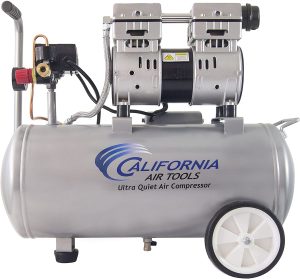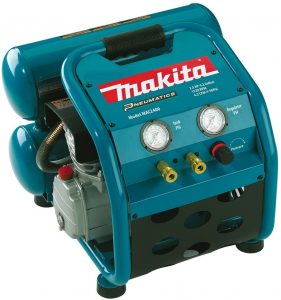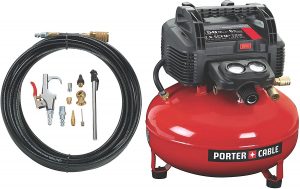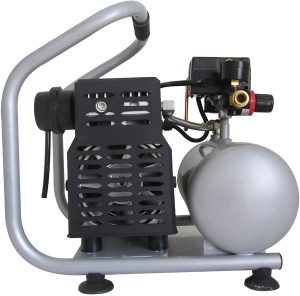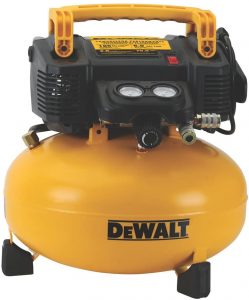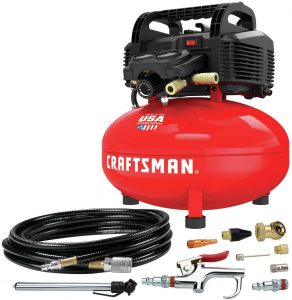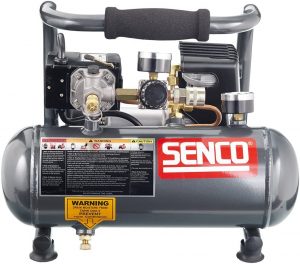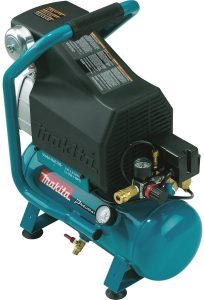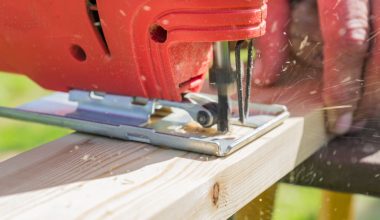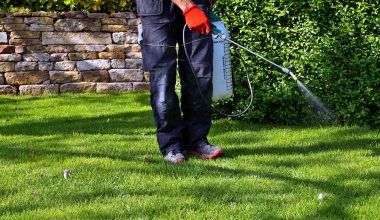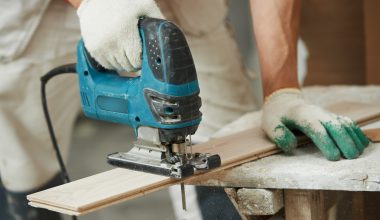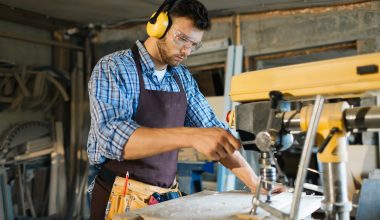Air Compressors For Home Garages: A Short Introduction
Air compressors for home garages are great tools to have. They can be helpful in a range of ways – from powering pneumatic tools to inflating tires. They can also be hugely confusing. For example, being available in so many different shapes and also sizes, it can be hard to know where to start when picking a compressor for home garage use.
In this review, we’ve picked out some of the best options for common uses. This includes powering nail guns, staplers, inflating tires, and also balls, all the way to light airbrush usage. For higher capacity tools such as air-powered impact wrenches, or powering a whole team through one machine, we recommend using a higher-capacity commercial compressor.
These machines also are a great choice for all your multipurpose garage needs and are light and mobile enough to bring to job sites and on trips as well. Obviously, everyone’s needs are slightly different, and we’ll discuss the details of each machine in more detail below. Let’s get into it!
Top 8 Air Compressors For Home Garages
Best Overall
1. California Air Tools 8010
Specifications
Air Volume: 2.20CFM @ 90 PSI
Noise rating: 60db
Tank Capacity: 8 Gallon
Type: Oil free
Weight: 54lbs
Our Rating
Check Price
Our Take
When it comes to picking a great compressor for your home garage, we think you really shouldn’t look any further than the 8010 from California Air Tools. That’s a bold claim for sure, but with rave buyer reviews and standout all-around performance, we believe we can more than back it up.
Delivering 2.20CFM @ 90 PSI, and a max pressure of 120 PSI, this machine is right up there with the most powerful units in this review. It’s plenty of air to drive a nailer, stapler, and other garage air tools, and with a large 8-gallon tank, you can do bigger jobs without waiting on it to recharge. Even for such a large tank, the refill time is very impressive at 165 seconds, which is another added bonus.
Noise is always a big problem with compressors in the garage, and it’s here that the CAT machine shines again. Working at only 60db, it’s exceptionally quiet compared to others in this test, and your ears will thank you for it.
Finally, California Air Tools’ reputation for quality is one of the best out there, so you can be sure that you’re making a great investment in a reliable tool that will last. For the home and garage environment, what’s not to like?
Best Performance
2. Makita MAC2400
Specifications
Type: Oil lubricated
Noise rating: 79db
Air Volume: 4.2CFM @ 90 PSI
Tank Capacity: 4.2 Gallon
Weight: 81lbs
Our Rating
Check Price
Our Take
When it comes to demanding applications, the Makita MAC2400 is a great go-to garage compressor. Powered by Makita’s big-bore piston which is connected to a 2.5hp motor, this machine is the most powerful in this test.
Delivering 4.2CFM @ 90 PSI, and up to 130 PSI in the tank, this machine is capable enough for job site settings and powering two nail guns simultaneously. This extra power also makes it a great choice for inflating pickup tires and other higher load applications where the smaller compressors will start to struggle.
It’s worth noting that this is an oil-lubricated machine, which might not be everyone’s number one choice. Oil lubrication is more effective in cooling the pump than an oil-free pump, which means that the compressor can go through many more cycles before overloading due to high temperature. This makes it ideal for long and repeated use when a smaller compressor won’t suffice. The downside though is that you need to keep the oil topped off.
For the high demanding buyer, we think the Makita is a great choice. Delivering outstanding power for its size, and more importantly the ability to deliver that power consistently, this is a standout high-performance compressor.
Best Value
3. PORTER-CABLE C2002
Specifications
Air Volume: 2.6 CFM @ 90 PSI
Tank Capacity: 6 Gallon
Type: Oil free
Weight: 34lbs
Our Rating
Check Price
Our Take
Hugely popular with DIYers and with over 3000 buyer reviews, the PORTER-CABLE C2002 is a great option if you’re working to a slightly tighter budget. That does mean it suffers from a few shortcomings compared to the higher performance offerings, but for some, that’ll be a reasonable trade-off to accept.
This compressor is what’s typically called a “pancake” compressor, so-called because the flat circular air tank looks rather like a pancake and sits below the air pump. It’s a very compact arrangement and lends itself well to a compressor for home garages.
This unit delivers 2.6 CFM @ 90 PSI, which is enough for most small hand tools, but potentially not enough air for more demanding tools like impact wrenches to run effectively. That said, it’ll be fine for standard car tires, balls, and most things you’ll find around the garage. It’s also a light compressor – weighing just 34lbs – which makes it ideal for moving around the job site as you work.
Why did we not rate it as the best overall? Well for one it’s a bit noisy. That might not be a huge problem in home environments, but if you live in a busy urban area then it could be a problem. Secondly, a small number of buyers have reported the occasional quality issue – which appears to be less common for other brands. All in all, though it’s a compelling option at a lower price point than the California Air Tools compressor, just be prepared for a bit more noise.
4. California Air Tools CAT-1P1060S
Specifications
Noise rating: 56 db
Type: Oil free
Air Volume: 1.2 CFM @ 90 PSI
Tank Capacity: 1 Gallon
Weight: 29lbs
Our Rating
Check Price
Our Take
Next up we have another offering from California air tools, which is a bit more specialist than some of the other compressors in this review. The 1P1060S is designed to be lightweight and extremely mobile, making it suited to applications where you’ll likely find yourself moving around – such as using a nail gun to assemble a fence or a deck, or any other form of construction.
Equipped with a smaller air tank of just 1 Gallon, and a rating of 1.2 CFM @ 90 PSI, this unit is powerful enough to operate a nail gun or stapler effectively but will struggle for applications that require more air volume.
That trade-off in power comes with two advantages – noise and weight. This is the quietest compressor in this test, making it extremely good for on-site client work where noise is a concern. Paired with the lightweight of just 29lbs, you can easily move room to room or along a fence line as you complete your job.
In summary, this is a slightly more specialist option than some of the other compressors in this test, but it’s a very high-quality machine and is designed to meet a very common need. In the right hands, it’ll be the perfect tool for the job.
5. DEWALT DWFP55126
Specifications
Air Volume: 2.6 CFM @ 90PSI
Noise rating: 75db
Tank Capacity: 6 Gallon
Type: Oil free
Weight: 30lbs
Our Rating
Check Price
Our Take
Very similar in stature to the PORTER-CABLE design, the DEWALT DWFP55126 is another oil-free pancake compressor designed for home garage use. This machine is also very popular and will be a good choice for a number of common use cases.
From a power perspective, you’re looking at 2.6 CFM @ 90PSI which is a good amount of air volume for a compressor of this size, paired with a 6-gallon tank. That’s enough to run many common tools around the home garage, but perhaps not quite enough horsepower to be running multiple demanding tools simultaneously.
It’s certainly a light and portable option, however, and will be easy to transport at just 30lbs. Noise-wise, it’s quite loud at 75db, perhaps making it less suited to applications where noise is a chief concern. DEWALT has cleverly designed the control panel to be covered in normal use, and with a sturdy and stable design like this, you can be confident it will withstand life on a job site.
Wrapping things up, this is a good quality pancake compressor, perhaps not a standout in any one area but nonetheless a solid option as a compressor for a home garage.
6. CRAFTSMAN CMEC6150K
Specifications
Air Volume: 2.6 CFM @ 90 PSI
Tank Capacity: 6 Gallon
Type: Oil free
Weight: 30lbs
Noise rating: 71db
Our Rating
Check Price
Our Take
Another very similar pancake design, this time from Craftsman in the form of the CMEC6150K. Very similar in almost all aspects to the DEWALT and the PORTER-CABLE, this handy little compressor is designed for home garage use.
With capacity for 2.6 CFM @ 90 PSI, this compressor will be perfectly at home with the most common garage tools and has adequate capacity for two simultaneous lightweight tools. Due to the relatively low volume and larger tank, this unit doesn’t have the fastest recharge time in the test but is not really designed for heavy repeated use.
The oil-free air pump design found on all three of these pancake compressors certainly keeps required maintenance to a minimum, making this machine well suited to occasional use. It’s light and mobile at just 30lbs and will be easy to store away due to its compact size.
In choosing between this, the DEWALT and the PORTER-CABLE, which are all very similar, we opted for the PORTER-CABLE as our top choice because it had many more positive buyer reviews across the internet.
7. Senco PC1010
Specifications
Tank Capacity: 1 Gallon
Type: Oil free
Air Volume: 0.6 SCFM @100PSI
Noise rating: Quiet
Weight: 20lbs
Our Rating
Check Price
Our Take
Senco’s PC1010 machine is another super small and quiet machine that is designed to be very good at a specific task – powering a nail gun or stapler. This unit is equipped with a very small 1 Gallon tank and is by far the lightest compressor in the review at just 20lbs. This compact and lightweight design make it very easy to move around the job site with you.
It’s also very quiet, making it well suited to indoor usage, but is definitely designed primarily for low power requirement options. Rated to 0.6 SCFM @100PSI, this machine will be very effective for small air tools, and single ball inflations. It will struggle if required to do multiple back-to-back inflations or large tires, so best to bear in mind if you’re considering that application.
In conclusion, you’re looking at an exceptionally light, compact, and quiet package that will be well suited to mobile usage to power low-requirement tools.
8. Makita MAC700
Specifications
Noise rating: 80db
Air Volume: 3.3 CFM @ 90 PSI
Type: Oil lubricated
Tank Capacity: 2.6 Gallon
Weight: 52lbs
Our Rating
Check Price
Our Take
This is a mid-powered machine from Makita, featuring a small tank paired with a very high-performance oil pump, which is capable of fast recharges. This design features a compact form and easy carry handle, making it easy to move around the job site.
Designed primarily for mobile commercial use, this compressor supplies 3.3 CFM @ 90 PSI but features a powerful motor. This makes it well suited to fast recharges and repeated mid-demand applications.
Rated at 80db, this isn’t the quietest compressor and might be better suited to full construction sites rather than in-home contractor work, where a California Air Tools machine might be more appropriate.
All in all, this is a workhorse machine from a well-regarded brand. For demanding uses and frequent recharges, this machine will be well suited, although it might be a better fit for a commercial setting than a home environment.
Home Garage Air Compressor Buyer’s Guide
So, you’ve decided you need a compressor for your home garage, but just what features should you be looking for? Compressors can be rather complex to understand, particularly with so many different numbers and ratings! In this section, we’ll highlight some of the main features you should be thinking about.
Air Volume
The most common number you’ll find when comparing air compressors is the air volume rating. This is typically quoted as a number of cubic feet per minute (CFM), at a given PSI (normally 40 or 90 PSI). This number is important because it gives you a measure of the volume of air the machine can deliver at a given pressure, which in turn determines what tools you can use with it. We’ll go into what machines need what CFM below.
Max Pressure
Max air pressure will give you an idea of what the maximum pressure is that the compressor can work to. Again, this is useful for certain use cases where pressure is more important than air volume. We’ll outline this in more detail below.
Tank Capacity
The tank capacity will help you understand how much use you can get out of the compressor before it needs to recharge. Some applications use a lot of air volume repeatedly, and they will require a large tank. An extreme example could be repeatedly inflating large semi tires. A low-requirement example might be occasionally firing a nail gun. Using airbrushes with paints like chalk paint can also be demanding.
Common Usage Requirements
The home garage setting has a number of different possible tools, so we’ve highlighted the air requirement for a few of them. Bear in mind this is an average number, and you should check it against the actual tools you’re likely to use.
- Angle grinding: 5-8 CFM
- Brad Nailing: 0.3 CFM @ 90 PSI
- Drilling: 3-6 CFM @ 90 PSI
- Frame Nailing: 2.2 CFM @ 90 PSI
- Spray Painting: 3-11 CFM @ 90 PSI (sometimes bigger tanks required)
- Impact Wrench: 3-8 CFM @ 90 PSI
- Tires: 2 CFM @ 90 PSI
Quincy Compressor has a great knowledge center full of resources available here.
Noise
Air compressors can be noisy tools, and for some environments, that’s an important consideration. If you’re doing a lot of indoor work like nailing, it might be worth opting for a lower power compressor (nailing has a low requirement) in order to get a quieter unit. Obviously, this is a trade-off, and generally, the more powerful compressors are louder.
Size And Weight
For portable use, size and weight are important to think about when choosing the right compressor. If you’re going to be assembling a large structure with a nail gun, you might be moving around the structure and will need to move the compressor around with you. Getting a smaller unit could be a huge benefit.
It’s also worth noting that there are additional portability options on some of the larger compressors. Often, you’ll find those equipped with larger tanks fitted with wheels to enable them to be moved around more effectively.
Oil Or Oil-Free?
Oil compressors are better lubricated and are better suited to longer periods of use because the oil keeps the air pump cool. This comes with an additional reliability requirement though, because the oil must be monitored, changed, and topped up.
Oil-free compressors are a popular choice for occasional DIY users because they don’t require as much maintenance. That said, they do tend to overheat if they are used heavily for extended periods.
Air Compressor For Home Garage FAQs
What Size Air Compressor Is Best For Home Use?
The right size air compressor for home use will depend on what tools you are looking to run with it. Let’s go over some common use cases:
For tires, nailers, staplers, and very light impact wrench usage, a compressor rated to 4 CFM at 90 PSI should suffice.
If you’re doing lots of repeated impact wrench work, or you are spray painting or using several tools simultaneously, you’ll need to look into a higher-powered compressor. These are typically aimed more toward commercial use.
What Is The Best Brand For Air Compressors?
There are many great brands that manufacture air compressors. However, the best for you will depend on your budget and intended use. To make some broad generalizations, California Air Tools and Makita make high-quality, reliable, and high-performance compressors that are well suited to demanding homeowners or commercial settings.
DEWALT, PORTER-CABLE, and also Craftsman are more suited to the more value-oriented DIY and home use market, and sometimes you’ll find yourself making compromises on quality.
How Big Does An Air Compressor Need To Be?
This really depends on what air tools you are planning to run, as some are more demanding than others. Below you’ll find a number of common applications:
- Angle grinding: 5-8 CFM
- Brad Nailing: 0.3 CFM @ 90 PSI
- Drilling: 3-6 CFM @ 90 PSI
- Frame Nailing: 2.2 CFM @ 90 PSI
- Spray Painting: 3-11 CFM @ 90 PSI (sometimes bigger tanks required)
- Impact Wrench: 3-8 CFM @ 90 PSI
- Tires: 2 CFM @ 90 PSI
How Big Should An Air Compressor Be For A Sandblaster?
Sandblasters have a very high CFM requirement, and also typically need 20-200 CFM depending on the nozzle and setup you’re using. That is well beyond the capacity of any compressor for a home garage, and you’ll need to turn to a commercial compressor to find the required capacity.
What Is The Best Air Compressor For Home Use?
This really depends on your use case, but overall, we believe the California Air Tools 8010 is a great choice. Delivering 2.2 CFM at 90 PSI, this machine has enough power on tap for most basic air tools. Equipped with a powerful motor, this machine can recharge its large 8-gallon tank very quickly and does so very quietly.
It’s also substantially quieter than the popular pancake compressors sold by other firms, which we see as a huge plus.
